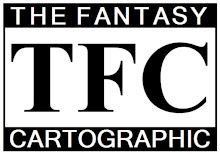So I received in the mail a few weeks ago my (two, ha ha ha) copies of James Raggi's Wierd Fantasy Roleplaying. I'm not going to provide you with a review of it, because, frankly there are a ton of them out there already. I'm fairly certain that googling it would yield you a bunch of results. Suffice it to say that I agree with most of the 'good' reviews that you have probably read of it. (I may get around to posting more thoughts on it at some point, but none of my thoughts strike me today as so original that I need to type them.)
But what I have realized is that I want to produce gaming material for this game. Of course, compatibility would be there, but his game has enough of its own personality that trying to write material for it would be a fun and interesting challenge. Some of the material has been bubbling in my consciousness for quite some time and hasn't been inspired directly by his work, but other material is a direct result of reading WF.
Case in point: I commented here that I would love to write a bard class for his game. Reading the majority of the other comments to that post indicate that most people don't care for the bard. I don't really care for the AD&D bard (the version with which I am most familiar) but surely a class that relies on charisma can be of value in the 'wierd' world.
But how do you make the new class distinctive enough and wierd enough to fit into that game? If you own the game, you understand that James worked very hard to make each class unique/useful/interesting (from a game mechanic perspective) in its own way: Only fighters get better at fighting. Halflings have great saving throws. Magic-users cast spells. Etc. What aspect of the bard do you formalize in a game mechanic to make it worth existing as a class?
Someone in the comments to that post said that, in their game, they added a few skills to the specialist skills list that matched their conception of the 'bard', thereby making the bard merely a specialist who allocated his points toward those skills. That is one way to do it. I had actually been thinking of also making the bard similar to the specialist, but instead coming up with several different skills that only the bard has access to. Problem with that is you might then introduce new rules to account for or make use of those skills. Not necessarily a big deal, but I don't want to start writing new rules for WF.
Perhaps a combination of spell-like abilities governed by a skill system similiar to the specialists'? Or is that more of what I just said I didn't want to do?
Back to the earlier question of what does the class do in the game: Perhaps he makes his allies better and his enemies weaker, during combat or elsewhere, through wit, song, special abilities. Does there need to be a wierd twist? Not sure.
(Apologies for the stream of consciousness writing--sometimes I have to follow it to where it takes me.)
Case in point #2: I like so-called 'Vancian magic' as much as the next old time D&D player, but how can it be made (beyond interesting spell descriptions) wierder? And if not wierd for the DM, at least for the players. I have some ideas.
There are other cases. Things that have been sitting on the shelf waiting for a reason to make an appearance. Perhaps WF provides the catalyst to get them rolling.
Thursday, October 14, 2010
Subscribe to:
Post Comments (Atom)








The trick with a bard in old games is the problem with charisma-style skill checks. Old school often wants players to do the "charisma" stuff themselves, rather than relying on a roll of the dice. I like the Castles and Crusades bard quite a bit, but I don't know that it fits well with weird fantasy games.
ReplyDeleteThat is a great point regarding 'player' skill versus 'character' skill, and one that I tend to agree with. Definitely something to consider if I push forward with the bard.
ReplyDeleteI'm not familiar with the C&C bard. Perhaps I need to look into it...